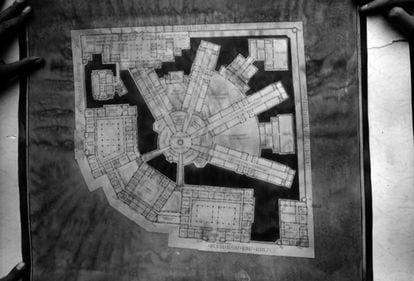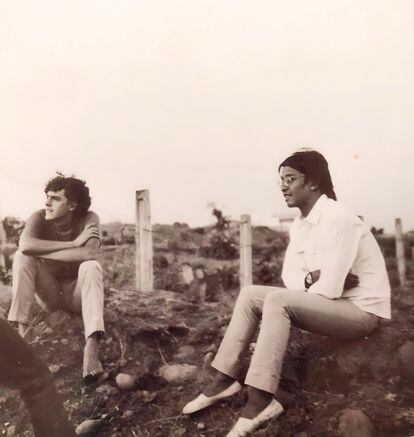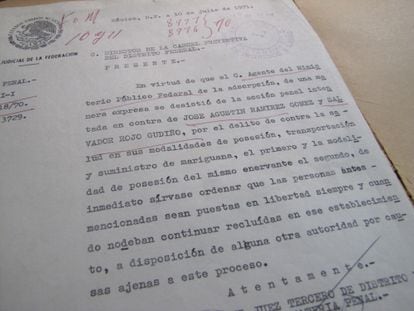There are just five loose sheets. Typed, with handwritten notes. For more than 50 years they have been kept in a brown cardboard folder, with the label of the extinct Department of the Federal District, what is now Mexico City. It is judicial file 8977/70 from the old Lecumberri Penitentiary. They are named after the prisoner: José Agustín Ramírez Gómez, known to everyone simply as José Agustín, the Mexican writer who died on January 16. The crime: possession, transportation and trafficking of marijuana.
in his book Prison rock, José Agustín narrated his time in the penitentiary: after a trip with his wife Margarita Bermúdez to Acapulco – where he enjoyed a dose of LSD on the beach – on December 14, 1970 he was unjustly detained in Cuernavaca, Morelos, for allegedly belonging to a gang dedicated to marijuana trafficking, along with his friend Salvador Rojo Gudiño and three other men. His release from prison, he wrote, was on Saturday, July 7, 1971, but the file slightly corrects his version: he actually left on July 10.
The arrest was plagued by irregularities and was led by Arturo The black Durazo, the archetype of the corrupt Mexican police officer, along with elements of the then Attorney General's Office (PGR) and United States agents. On December 17, they entered Lecumberri, under preliminary investigation 3237/70, as recorded in the documents preserved in the Historical Archive of Mexico City. José Agustín was assigned file 8977/70; to Salvador, his friend, 8976. They were accused of trafficking 17 kilos of marijuana. He always said that he only carried a can with something for his personal consumption.
The writer reconstructed his entry to Lecumberri: “It was a sunny noon. They took our information at the entrance, they stole what they could from the inspection booth… From there they sent us to dormitory H, the one on duty, which was decorated with numerous Christmas lights. 'Those hippies!', the eldest in the bay greeted us. 'Goodbye, manes!', several prisoners shouted at us.”
The case was assigned to the Third District Court in Criminal Matters, headed by Judge Rubén Montes de Oca, whom they never saw during the almost eight months of confinement. On December 20, they were formally detained. Page 418/70 was assigned to the judicial process.
One of the documents kept by the Historical Archive of the Mexican capital says: “I am sending you a certified copy of the order of formal imprisonment issued today to the accused Héctor Enrique Torres Cárdenas, José Agustín Ramírez Gómez, Alberto Javier Nieto Cárdenas, Salvador Rojo Gudiño and Raúl Valenzuela Carreón for the crime of against health, in its modalities of possession, transportation and trafficking of narcotics in the form of marijuana (…) for which they must continue to be held in this Prison.”
Criminal record
José Agustín wrote that they paid 4,000 pesos so that they would not be transferred to cell F, which corresponded to them and where they would live the harsh reality of prison. On the contrary, they remained in the H. “We felt, in some way, in the anteroom of hell… The H was the hall of the rich and the police treated those deposited like sultans, because they were the ones who had money,” he wrote. he in Prison rock.
An official letter from January 8, gives an account of their stay in bay H, which was the entrance, but to which they clung: “The inmates of dormitory 'F' Salvador Rojo Gudiño, Raúl Valenzuela Carreón, José Agustín Ramírez Gómez , Alberto Javier Nieto Cárdenas and Héctor Enrique Torres Cárdenas, register as fajineros in Bedroom H and move to it.”
The fajineros were in charge of cleaning the cells, but José Agustín admits in his memoirs that they had to give several bribes to avoid these tasks. In Lecumberri they charged for everything: the shower, food, electricity, having a mat, telephone calls, added to the risk of being beaten by other prisoners or jailers. Not for nothing did they nickname it “The Black Palace.”

On January 8, 1971, the Lecumberri authorities ordered a search to see if José Agustín had a criminal record during the previous 15 years. The young writer was 26 years old at the time and it always seemed absurd and unfair to him that the prison was full of young hippies—jipitecas in their Mexican version—arrested for carrying small doses of marijuana.
“After searching the respective card holder from the year 1956, no previous income from José Agustín Ramírez Gómez was found,” says one of the preserved documents. His case was handled by lawyer Arsenio Farell, of whom he kept an unpleasant memory because he did little in his defense and promised him that he would be released on January 15, something that did not happen.
Writing, salvation
In prison, José Agustín began writing his emblematic novel It's getting late (end in lagoon). “I didn't stop writing, I had already written more than three hundred pages… I started writing in the afternoon and continued at night.” She wrote by hand, in a “very fat” notebook with handwriting so small that the equivalent of four typed pages could fit on one page.
The writer remembered the glorious days, prior to prison: “I spent entire afternoons and nights locked in my cell but at the same time well installed in the bright days in Acapulco… I was transported to a balcony of eternity, where the breeze and the “The sun always bathed my face with serene happiness.”
The play also emerged from his stay in prison. Vicious circlereleased in 1974. The piece narrates the dilemma of a group of imprisoned friends and how luck plays out so that one of them, the innocent one, has to admit the crime in exchange for the rest obtaining their freedom.
The Liberation
To regain his freedom, José Agustín turned to the producer Angélica Ortiz, mother of the singer and actress Angélica María, with whom he had a brief romance that almost fractured his marriage with Margarita Bermúdez. Ortiz had good esteem for him — together they undertook the film I already know who you arewhich he dire
cted—and intervened with Mario Moya Palencia, then Secretary of the Interior, to help him leave Lecumberri.
“Moya Palencia asked Angélica [Ortiz] “For me to write him a long letter explaining my situation and see what I could do… It was a dignified, absolutely sincere letter, which moved Moya Palencia.” wrote the author. The secretary wrote to the then head of the PGR, Julio Sánchez Vargas, telling him that José Agustín was a “estimable writer” and to set him free.

In his memoirs, José Agustín wrote that the miracle of his liberation occurred “on Saturday, July 7.” That day he was notified that he would be released, since the PGR dropped the criminal case against him. “I went out to the patio [de Lecumberri]. It was a very sunny day… Margarita arrived shortly after, radiant, more beautiful than she had ever been… She was coming from the court,” she noted.
But July 7, contrary to what José Agustín noted in his book, was actually Wednesday. His departure did occur on a Saturday, but the correct date was July 10, 1971, as stated in his release document.
The letter, signed that day by Judge Montes de Oca, says: “Since the Agent of the Federal Public Ministry expressly withdrew from the criminal action attempted against José Agustín Ramírez Gómez and Salvador Rojo Gudiño, for the crime of against health in its modalities of possession, transportation and supply of marijuana, (…) please order that the aforementioned persons be released.”
Salvador, his friend, was surprised to know that he would also go out; He was not aware of the efforts before the Government. He was a composer and had written the main theme of I already know who you are, the film that José Agustín directed and produced by Angélica María's mother. In fact, the arrest of both occurred in Salvador's house, in Cuernavaca. The other three men with whom they were admitted stayed in prison longer.

When he left, the writer recalled, he was surprised by the clean blue sky, without smog, with monumental clouds that manifested the miracle of freedom. Later, about his time in Lecumberri, he reflected: “Prison represents one of the worst defeats that can occur, but precisely because of that, because of its radicality, it can be transmuted into a great success.”
And José Agustín, with his work, his legacy, fulfilled that premise: he left prison to become the literary legend that would change the lives of generations of young people.
Subscribe here to the EL PAÍS México newsletter and receive all the key information on current events in this country
#felt #anteroom #hell #José #Agustín39s #months #Lecumberri #prison